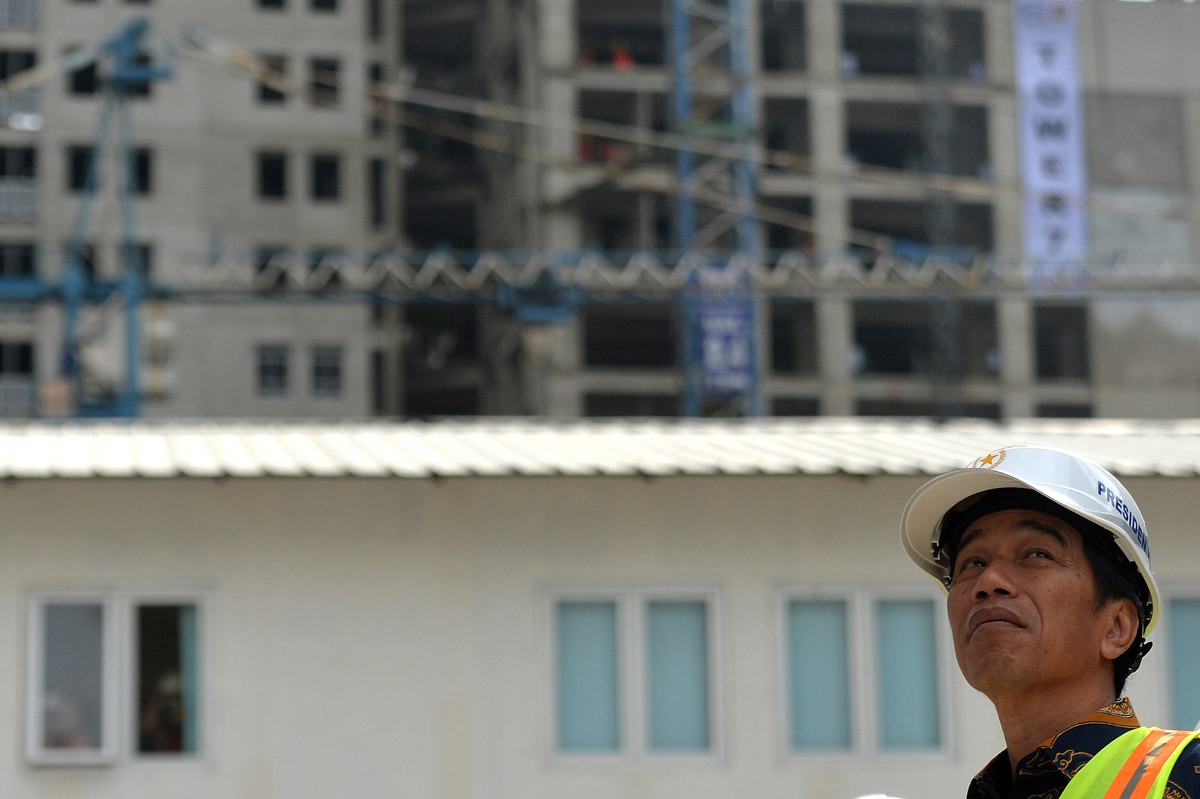Popular Reads
Top Results
Can't find what you're looking for?
View all search resultsPopular Reads
Top Results
Can't find what you're looking for?
View all search resultsJokowi wants MRT during Asian Games
Construction to be completed during Asian Games in 2018 MRT to start operating in March 2019
Change text size
Gift Premium Articles
to Anyone
P
resident Joko “Jokowi” Widodo says the project he initiated as Jakarta governor, the country’s first MRT system, will be a source of pride when the city co-hosts the Asian Games in 2018.
Jokowi inspected MRT construction for the fourth time on Thursday, at the Setiabudi underground station in South Jakarta to mark the completion of the drilling process of the underground portion of phase one connecting Lebak Bulus in South Jakarta to the Hotel Indonesia traffic circle in Central Jakarta.
The MRT will commence operations in March 2019 prior to the presidential election.
“Construction will be completed during the Asian Games in [August] 2018,” he said.
The MRT is hoped to reduce chronic traffic congestion in the metropolis.
Jokowi said he was eager to push ahead with the long overdue project, nearly a quarter century after the first feasibility study was carried out in the 1990s during the Soeharto era and about 15 years since Japan offered support for the construction.
(Read also: Jokowi to inspect completed tunnel)
The President said the city administration did not need to worry about funding for the following MRT construction phases.
“It [the funding] can be from a combination of city and state funds. We can also use the public-private partnership [PPP] scheme or investment,” he said.
While completing the first phase, a detailed engineering design (DED) is being prepared for the second phase.
Jakarta Governor Basuki “Ahok” Tjahaja Purnama said the President had asked him to speed up the DED and commence construction of the second phase.
“He also asked us to speed up the MRT lane connecting the east and west parts of Greater Jakarta,” Ahok said.
The 13.5-kilometer second phase will connect the traffic circle to Ancol Timur in North Jakarta, which is expected to start operations in 2021, while the 87km third phase will connect Cikarang in Bekasi to Balaraja in Tangerang, Banten. The latter will start construction in 2020.
Accompanying Jokowi on his visit were State-Owned Enterprise Minister Rini Soemarno, Transportation Minister Budi Karya Sumadi, Jakarta Governor Ahok and MRT Jakarta president director William Syahbandar.
With the completion of the drilling, the underground part of the 15.7-km first phase is 80 percent complete. However, owing to slow progress in the elevated portion, from Senayan to Lebak Bulus, both in South Jakarta, the entire construction is just 65 percent complete.
Reggie, a resident of Lebak Bulus in South Jakarta said he had noticed construction progress as weeks went by.
Meanwhile, Andam, 31, a private employee who works at the Wisma Nusantara building near an MRT station being built near the traffic circle, said she often saw construction crews working nonstop at the site from the early hours of the day.
The first phase is expected to serve 173,000 passengers per day with 16 sets of rolling stocks.
MRT Jakarta corporate secretary Tubagus Hikmatullah expected the rolling stocks to arrive from Japan in March or April 2018.
He said, however, that the MRT would not be ready in time for the Asian Games, as the company would conduct a trial run of the 16 sets of rolling stocks gradually.
The project is likely to face roadblocks, among others, land acquisition and cost overrun, partly due to new standards for antiseismic buildings. The Jakarta Financial Management Board (BPKD) estimated that the cost of the project, funded by the Japan International Cooperation Agency (JICA) in the form of a soft loan worth ¥125 billion (US$1.1 billion), would increase by up to Rp 3 trillion ($225 million).










